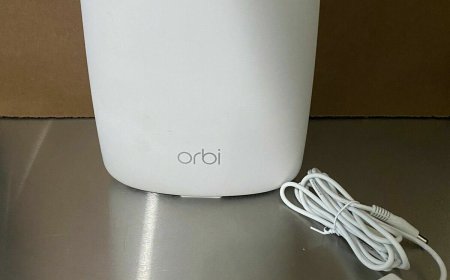The Smart Buyer’s Guide to Purchasing 2nd Hand PC Components
Learn how to safely and effectively buy 2nd hand PC components without compromising performance or reliability. Ideal for gamers, professionals, and budget builders.

Building or upgrading a computer doesnt always require brand-new parts, especially when you can save significantly by opting for 2nd hand PC components. Many tech enthusiasts, gamers, and businesses turn to second-hand options for budget-friendly builds or system upgrades. However, its important to make informed decisions when purchasing used components to ensure they meet your performance expectations and reliability standards.
Why Buy Used PC Components?
Cost Efficiency
One of the most compelling reasons to consider second-hand components is the cost. High-performance parts like GPUs, CPUs, and SSDs often come at a fraction of the original price when bought used. This makes it easier to build a powerful system without exceeding budget constraints.
Extended Value from Older Generations
Many previous-generation components still offer excellent performance for daily use, gaming, or professional applications. For users who dont necessarily need the latest tech, buying used can provide tremendous value.
Commonly Bought 2nd Hand Components
Graphics Cards (GPUs)
GPUs are among the most sought-after used parts due to their high retail cost. When buying second-hand, its essential to check for signs of overheating, excessive mining usage, or damaged fans.
Central Processing Units (CPUs)
Used processors can offer excellent value if they have been well-maintained. Make sure the pins are intact (for AMD CPUs), or that the contacts are clean and undamaged (for Intel CPUs). Its also helpful to ask whether the CPU was overclocked.
RAM Modules
RAM is generally safe to buy used as long as it has no physical damage and is compatible with your system. Memory doesnt degrade quickly and tends to have a long lifespan if not subjected to excessive voltages.
Motherboards
Motherboards are a riskier second-hand purchase since they have many delicate parts and soldered connections. Check for swollen capacitors, clean connectors, and updated BIOS versions when applicable.
Power Supply Units (PSUs)
Used PSUs can be unreliable if theyve been stressed or used for years without proper care. Only buy high-quality models from reputable brands and avoid units that lack safety certifications or appear damaged.
Storage Drives
While SSDs and HDDs are cheaper used, they do wear out over time. Always check the drive health using tools like CrystalDiskInfo or check the SMART data if possible before purchasing.
Where to Buy Second-Hand Components
Trusted Retailers and Refurbishers
Companies like Subserve offer tested and guaranteed refurbished components with return policies and warranties. Buying from such sources provides added confidence compared to buying from unknown individuals.
Online Marketplaces
Platforms such as eBay, Amazon Renewed, and Facebook Marketplace are popular choices, but they come with varying levels of risk. Always check seller ratings, ask for photos, and verify return policies.
Local Tech Communities
Forums, Reddit groups, and local PC-building communities can be great places to find deals and get honest feedback from other users. Youre also more likely to meet sellers in person for testing.
Things to Check Before You Buy
Compatibility
Ensure that the part youre buying will work with your existing system. Use online PC building tools or check manufacturer websites to confirm compatibility with your motherboard, case, and power supply.
Testing and Functionality
Whenever possible, test the component before buying. A GPU should display video output, a CPU should boot in a test system, and memory should pass diagnostics tools.
Warranty or Return Policy
Even if the product is used, some sellers offer short-term warranties or allow returns. This extra layer of protection can help you avoid faulty parts.
Red Flags to Watch Out For
Damaged or Modified Hardware
Look for any signs of physical damage, such as bent pins, burn marks, or signs of tampering. Avoid parts that have been modified unless you know what youre doing.
Unrealistically Low Prices
If a deal seems too good to be true, it probably is. Scammers often list parts well below market value to lure in unsuspecting buyers.
Lack of Product Information
Sellers should be transparent about the component's usage history, condition, and specifications. If they hesitate or provide vague answers, consider walking away.
Benefits of Buying from Subserve
Quality Assurance
Subserve tests all components rigorously before resale, ensuring functionality and reliability. This helps reduce the risk typically associated with buying used components.
Technical Support
Purchasing from a professional source often includes access to expert advice. Subserve can help recommend compatible components, offer installation tips, and provide guidance throughout the buying process.
Warranty Options
Many refurbished products from Subserve come with short-term warranties, offering peace of mind and better protection compared to peer-to-peer sales.
Tips for Maintaining Second-Hand Components
Clean and Dust Regularly
Dust can degrade component performance and longevity. Regular cleaning of fans, heatsinks, and filters can improve cooling and keep parts working efficiently.
Monitor System Health
Use software tools to track system temperatures, voltages, and performance. This helps identify early signs of failure and allows you to act before serious issues arise.
Upgrade Firmware and Drivers
Ensure that all your components run on the latest firmware and drivers. This improves compatibility and performance while minimizing bugs and vulnerabilities.
Conclusion
With proper research and caution, buying 2nd hand PC components can be a practical and cost-effective way to build or upgrade your computer. Whether youre a gamer on a budget, a student assembling a workstation, or a business upgrading legacy systems, second-hand hardware offers the performance you need at a fraction of the cost. Retailers like Subserve make the process safer by offering tested parts, expert support, and warranty options.






































